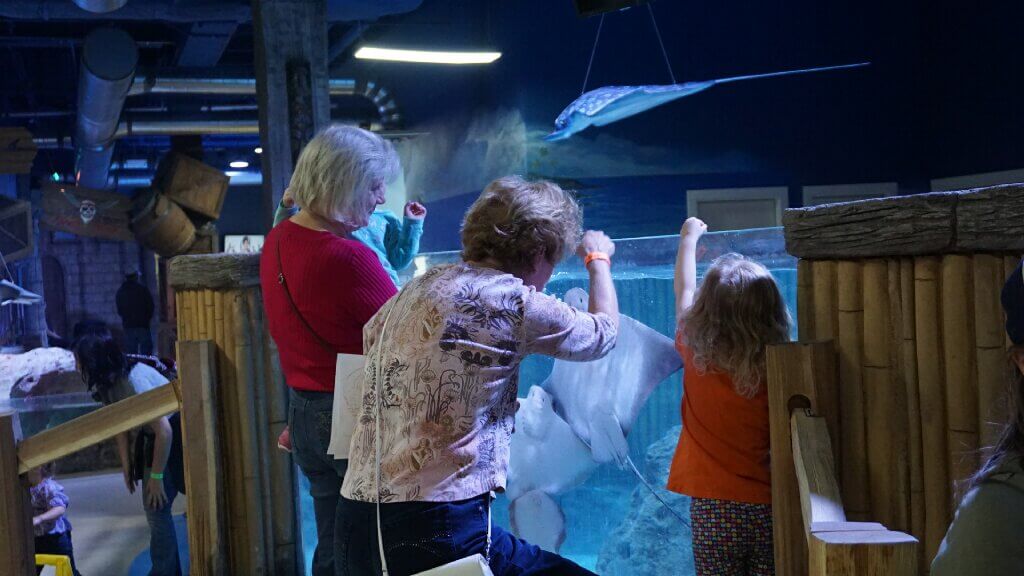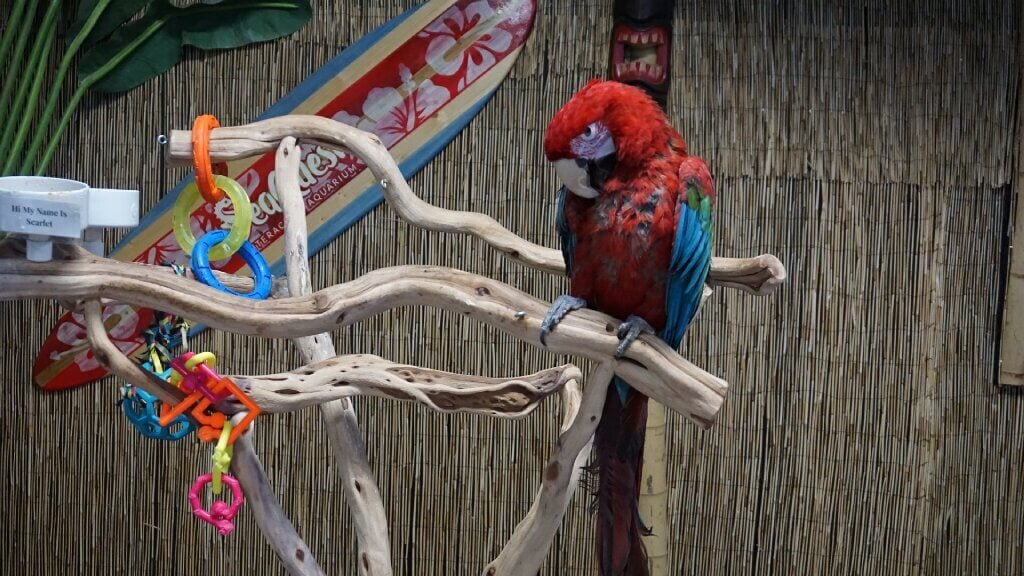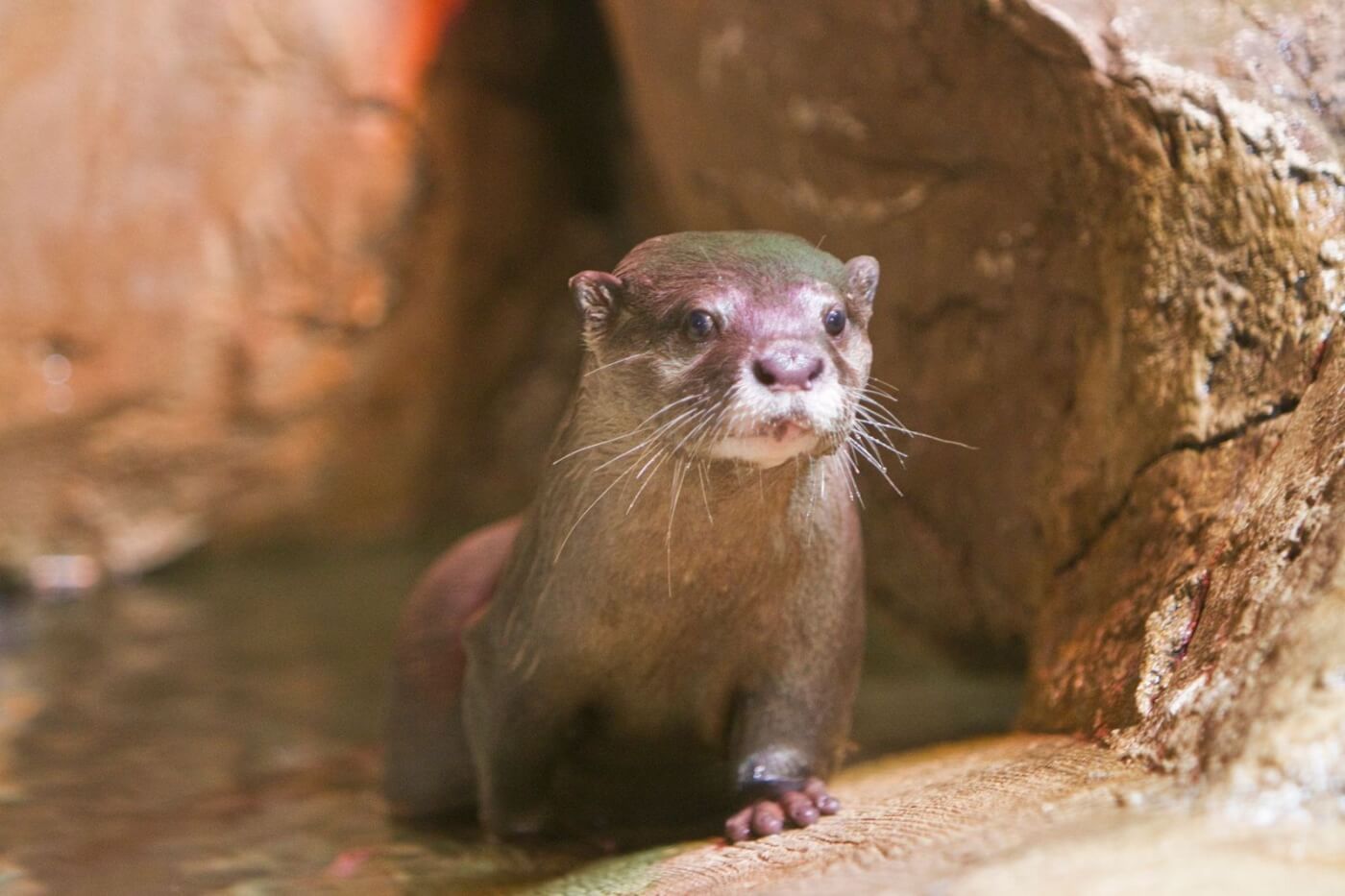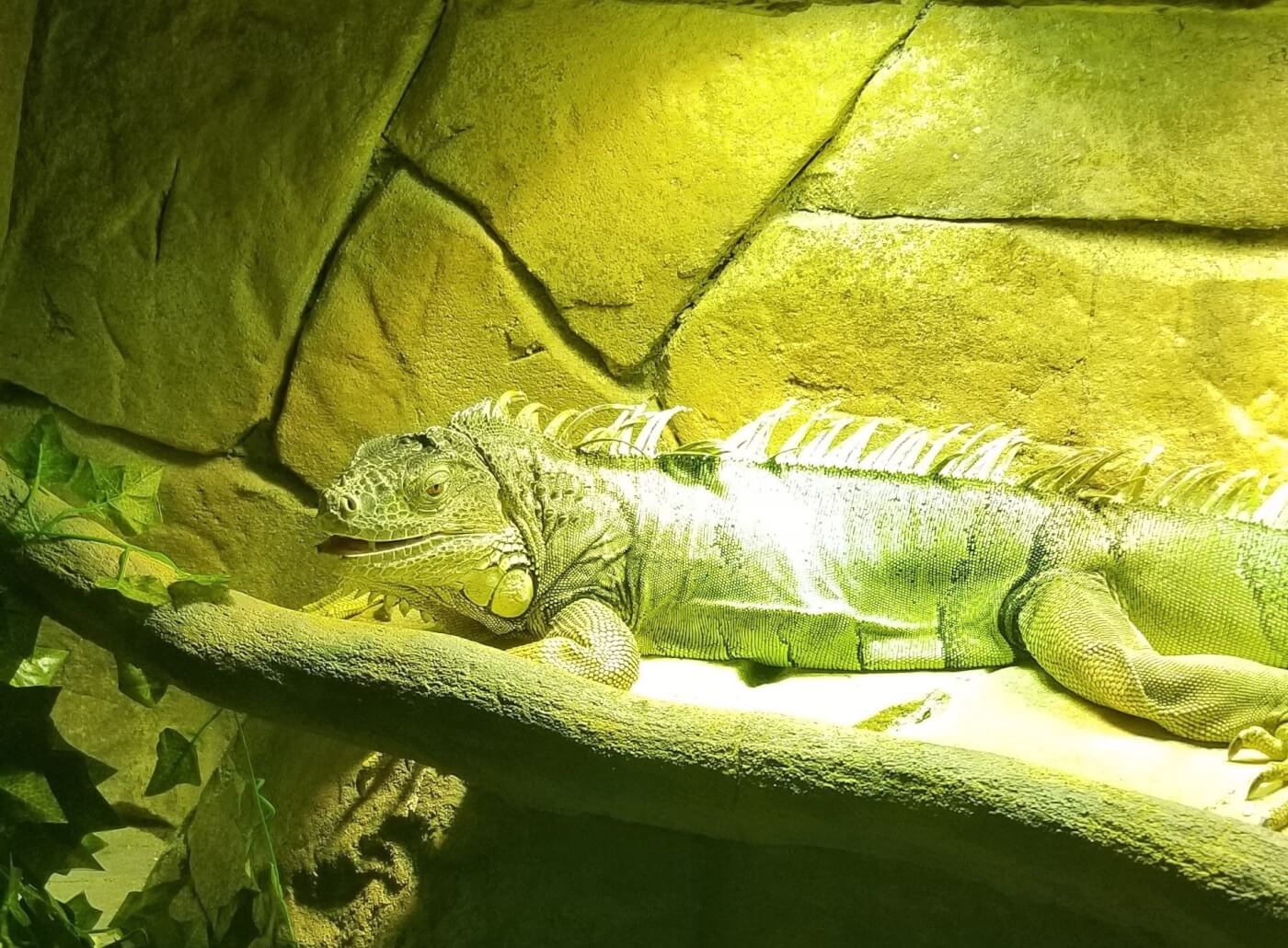Interactive Aquariums—Notorious for Exploiting Animals
Update (April 17, 2025): Following SeaQuest’s bankruptcy filing in December 2024 and then-CEO Vince Covino stepping down from his role, the remaining four locations were sold to new owners.
The company’s failure was a sign that compassionate consumers don’t want to fork over their dollars to look at fish, otters, and birds suffering in cramped, filthy enclosures and forced into stressful public encounters. Yet, the new owners are attempting to rename and rebrand the dingy aquariums despite knowing that animal exploitation is a losing business model.
Don’t be fooled by new catchy names. The new owners already have ties to SeaQuest and there is no real indication that they will put animal health and welfare above profits or that they will stop harassing animals through public encounters.
These same interactive aquariums are still confining animals in cramped and crowded enclosures inside malls and profiting from their suffering. We’re calling on the new owners to shut down the remaining locations and surrender the surviving animals to reputable facilities that can finally get them the care they desperately need.
SeaQuest’s Sordid History:
SeaQuest aquariums were plagued by animal welfare issues, animal deaths, legal violations, and injuries to employees and the public from direct contact with animals. In just six years, SeaQuest racked up over 130 U.S. Department of Agriculture (USDA) citations for failing to meet the bare minimum required under the federal Animal Welfare Act.
Taking action to help animals at interactive aquariums has never been easier.
Here’s How PETA Took Action and Won Against SeaQuest
- SeaQuest Roseville in Minnesota closed in February 2025 after nearly six years of confining hundreds of animals in squalid, hellish conditions. The closing came after SeaQuest announced a companywide bankruptcy and after the Minnesota Department of Natural Resources confirmed it had opened an investigation following PETA’s complaint alleging violations of state captive wildlife regulations. PETA’s complaint pointed to federal inspection reports revealing that SeaQuest Roseville kept animals in hazardous enclosures, failed to clean accumulated mouse feces, allowed flies to swarm around animals’ food, and let animals go months without regular visits from a veterinarian.
- SeaQuest Fort Worth closed in October 2024 after PETA submitted a complaint to local authorities over whistleblower reports from three former SeaQuest Fort Worth employees revealing that dozens of fish, rays, and sharks perished at the seedy facility or during transport there, including two nurse sharks, named Icarus and Achilles, who had likely starved to death as a result of extreme stress from being confined to a crowded, cramped tank. The complaint prompted the Fort Worth Police Department to open a criminal cruelty-to-animals investigation.
- After a lengthy history of federal and state citations, a license suspension, and illegal activity, SeaQuest Littleton in Colorado shut down in February 2024. Its closure came after PETA filed numerous complaints with federal and state authorities regarding dangerous and cruel incidents, including ones in which customers were bitten and animals suffered without adequate veterinary care. SeaQuest Littleton had been cited by the USDA when a wallaby named Ben drowned in a tank in his enclosure, and in less than a year, between June 2018 and April 2019, more than 40 incidents occurred at the facility involving injuries to humans.
- After PETA filed numerous complaints with various federal and state authorities detailing egregious animal welfare issues and numerous injuries to customers at SeaQuest Trumbull in Connecticut, the sleazy aquarium shut down in August 2023. This included a complaint to the USDA over reports from a former employee that animals at the facility were regularly denied veterinary care, often despite obvious health problems; were confined to cramped cages for months at a time; and had direct contact with the public that resulted in injuries to visitors.
- PETA sent a letter to Stonecrest, Georgia, calling on the city not to change the zoning law, which would allow SeaQuest to remain at the Stonecrest Mall. The corrupt former mayor of the city had allowed SeaQuest to set up shop in violation of the existing zoning law. Despite opposition from the public, the new zoning law was passed. Yet less than a month after the city changed the law to allow SeaQuest to stay, the company announced that it had sold SeaQuest Stonecrest and transferred all the animals to other facilities. PETA will continue to keep pressure on city officials to make sure this sleazy aquarium doesn’t reopen there.
- Sam’s Club ended the sale of discount tickets to SeaQuest following discussions with PETA.
- Just days after PETA wrote to the North Dakota attorney general reporting that SeaQuest CEO Vince Covino’s bid to open a cruel operation in a former Grand Forks department store was based on lies, Covino backed out of his plans to add this North Dakota location to his chain of petting zoo aquariums.
- PETA received records from Clark County Animal Control in Nevada showing that a second sloth died at SeaQuest Las Vegas nine months after the first sloth died there and that both animals died under similar troubling circumstances: They had each been at the facility for less than a year when they developed twitching behavior and had a reduced appetite just before their deaths. After PETA called on Clark County Animal Control to prohibit SeaQuest from obtaining any more sloths who may suffer the same fate, the agency said on record that it “cannot foresee granting SeaQuest permission for another sloth should they apply to have one.”
- In May 2019, SeaQuest withdrew its application to open a planned facility in Oyster Bay, New York. This victory came after PETA contacted the town’s board and identified legally required disclosures that SeaQuest failed to provide as part of its permit application. The town gave the shady company the opportunity to provide that information, but it opted to withdraw its application instead. Actor and PETA supporter Alec Baldwin had also sent a letter urging officials in Oyster Bay to deny the permit.
- In December 2020—as part of an agreement to settle a lawsuit filed by PETA, the Animal Rights Foundation of Florida, and activist Ana Campos—SeaQuest dropped its bid to open a location at The Galleria at Fort Lauderdale in Florida. The lawsuit alleged that the city violated zoning laws when issuing SeaQuest a permit. The permit was issued under the false pretense that SeaQuest is a museum—even though its primary purpose is exhibiting live animals with an emphasis on direct contact.

SeaQuest Has a Long History of Animal Neglect and Legal Troubles
SeaQuest facilities were sold to new owners as part of the company’s bankruptcy. SeaQuest’s former facilities are now operating as Woodbridge Aquarium & Wildlife Center in New Jersey, Layton Aquarium & Wildlife Encounters in Utah, NorCal Aquarium & Wildlife Adventures in California, and One World Interactive Aquarium in Las Vegas, Nevada. The greedy new owners may try to hide SeaQuest’s history of neglect and suffering with new names, but here’s what you need to know about the remaining facilities:
Trouble at SeaQuest Woodbridge in New Jersey
- On February 20, 2025, the New Jersey Department of Environmental Protection (NJDEP) finalized its order revoking SeaQuest’s Exhibitor and Endangered Species permits and later confiscated the regulated animals. The 15-page order cited more than 3,500 complaints against SeaQuest Woodbridge from members of the public and former employees, dozens of violations of captive animal regulations, and abysmal conditions—including infectious diseases running rampant through the facility, improper conditions in animals’ habitats that led to illnesses and deaths, animals crammed into enclosures that were far too small, sick animals apparently denied adequate veterinary care, and animal escapes.
- On June 25, 2024, the NJDEP issued SeaQuest a Notice of Violation and a $2,500 fine after an investigation revealed violations of several state regulations. The notice required that the facility immediately provide all regulated wildlife with adequate veterinary care and cease all public interactions with unauthorized animals. The agency also put SeaQuest on administrative probation until further notice, which prohibits them from acquiring any new regulated animals while under probation.
- On January 29, 2024, NJDEP urged SeaQuest to temporarily discontinue public interactions with animals due to a mycobacteria outbreak at the facility, which caused shell rot infections in the turtles. The agency noted that poor husbandry is one of the main causes of shell rot infections.
- On September 28, 2023, NJDEP sent a letter to SeaQuest documenting multiple concerns observed at the facility during an inspection, including: two macaws with an alarming amount of missing feathers; a two-toed sloth and a blue-tongued skink without access to adequate amounts of drinking water; an Asian water monitor without access to enough water to swim or soak in; a red tegu with abnormal white areas on his back that had not been assessed by the veterinarian; among other issues. The letter also noted that the facility failed to intervene when animals housed together showed signs of aggression, potentially leading to the death of a water monitor. The facility was also ordered to immediately cease all interactions with unauthorized animals. The agency put SeaQuest on a year-long probation, prohibiting the facility from acquiring regulated animals and implementing new public interactions due to continued violations of New Jersey’s exotic and nongame permit regulations.

Trouble at SeaQuest Las Vegas
- In December 2021, a door fell on an otter’s foot, resulting in the dislocation of one toe, a fracture to another toe, and a laceration of his footpad. The USDA cited and fined SeaQuest for the incident.
- In 2019, Clark County Animal Control cited SeaQuest Las Vegas, fined it $2,000, and revoked its exotic-wildlife permit for possessing unpermitted animals, including illegally bred otters. Clark County Animal Control subsequently reissued the permit but with stricter conditions.
- In October 2018, a capybara escaped while being transported in a dog carrier in the back of an open truck bed. The animal was found badly injured, bleeding from the face and limping, reportedly in a Target parking lot. SeaQuest was cited and fined for the incident.
- A former SeaQuest employee alleged that SeaQuest Las Vegas withheld food from animals to force them to interact with guests who pay to feed them.
- A February 2019 three-part investigative report exposed several issues with the SeaQuest Las Vegas exhibit, as described by five former employees who alleged that the facility is dangerous for the public, staff, and animals.
- One former employee reported that children stomped on birds in the interactive aviary, killing them, and that the dead animals were thrown into the garbage, reportedly to prevent SeaQuest from having to document their deaths.
- Another former employee reported a similar pattern with small turtles, some of whom were crushed by children. “I think they started with 12. By the time I left they had three,” he said.
- A former employee also reported that a large octopus was “literally cooked alive” after a change in the tank’s temperature overheated the water.
- According to reports, the former employees also provided videos and photos of “a sump room wall covered in black mold, a dead turtle they say was left to rot for days in the koi tank, and a bug-infested drain in the aviary where they say birds drank and bathed before interacting with guests.”
- In 2017, a former employee came forward with reports of apparent animal neglect at SeaQuest Las Vegas, saying that he saw hundreds of animals die.

From Government Records
- In December 2022, the USDA fined SeaQuest $4,500 for multiple alleged violations of the federal Animal Welfare Act. The fine addressed multiple citations for inadequate handling that resulted in the following: Guests were bitten by otters, coatis, and a kinkajou at the Layton, Utah location; a flying squirrel died after a door was closed on the animal at the Woodbridge, New Jersey location; and a door fell on an otter and injured the animal’s foot at the Las Vegas location.
- At SeaQuest Folsom in California, the USDA issued a critical citation after a parakeet was caught in a door and died.
- On June 6, 2023, the USDA cited SeaQuest Las Vegas after a wallaby jumped up at a child during an encounter, making contact with the child’s face.
- The USDA cited SeaQuest Folsom in California for jeopardizing the health and welfare of sloths by failing to ensure that their enclosures had the correct temperature and humidity, which could lead to multiple health issues and death.
- In December 2021, the USDA cited SeaQuest in Layton, Utah after a kinkajou bit an unsupervised guest who had reached under the door of an enclosure and an Asian small-clawed otter bit a guest during a public interaction session.
- According to records obtained by PETA, the USDA cited the SeaQuest location in Woodbridge, New Jersey, after a flying squirrel was closed in a door, killing the animal, in June 2021. The squirrel had been attempting to flee from an enclosure after an encounter with a visitor.
- In July 2020, a 1-year-old sloth named Flash died at SeaQuest’s facility in Las Vegas, Nevada. Flash was very thin when he died and had a history of weakness, twitching, and lack of appetite. PETA asked the USDA to investigate the circumstances that led to his death, including whether SeaQuest could adequately care for this species.
- Just nine months later, in April 2021, another sloth named Flash died under similar circumstances at SeaQuest Las Vegas. The second Flash had only been at SeaQuest Las Vegas for five months before he died. The necropsy documented that he had been found “minimally responsive on the floor” and had “developed twitching behavior” and lack of appetite—similar symptoms to those displayed by the first Flash, who died just seven months after his arrival at SeaQuest. When one sloth died at SeaQuest, the company simply got another, gave him the same name, and let him suffer the same fate.
- In January 2020, the USDA cited SeaQuest Layton in Utah a second time for allowing public interactions with Gus, a South American coatimundi, without adequate barriers or direct control of him. He bit a guest and an employee during a public interaction session. SeaQuest was first cited for failing to protect animals and the public with adequate barriers after Gus bit a guest and an employee in November 2019.
- After a female otter died in May 2018, the necropsy report stated that “[t]he stress of shipping to Vegas, introduction to a new environment and caging during construction may have caused fatal cardiac consequences.”
- Another otter named Jelly drowned after getting her arm stuck in a filtration system. SeaQuest Las Vegas admitted that it had never reported the incident to CCAC.
From Members of the Public Who Visited a SeaQuest Aquarium
- In September 2021, a visitor to SeaQuest Las Vegas documented that the tail of a wolf eel named Saturn had been partially eaten, leaving a painfully exposed tailbone. PETA immediately alerted Clark County Animal Control. Even though SeaQuest was already aware of the injury, it hadn’t bothered to contact a veterinarian about it until six days after PETA alerted authorities. Saturn was eventually euthanized after suffering for months.
- In January 2020, after a video of skittish goats huddled in a corner at SeaQuest Woodbridge in New Jersey went viral, concerned people took action and persuaded SeaQuest to close its goat exhibit at this location and move the goats to a local rescue facility. But then in 2023, the facility decided to force two more goats to suffer in a tiny pen inside their dingy shopping mall aquarium.
- Within a month of the grand opening of the SeaQuest aquarium in Folsom, California, a stingray died. The animal was found in a touch tank by a visitor who noticed the lifeless body, partially buried under sand. Reportedly, kids were touching the corpse.
- A visitor to SeaQuest Folsom documented that it took approximately two minutes for staff to return a fish to the water after the animal jumped out of an uncovered tank. The fall from the tank to the floor alone was enough to daze and disorient the fish, who was left to flop on the ground for a prolonged period of time out of the water, likely suffocating.

How You Can Help Animals at SeaQuest
These violations and SeaQuest’s apparent disregard for animals should be a red flag to everyone, especially those considering doing business with any interactive aquarium. If malls want to add some entertainment to their shoppers’ experience, there are tons of animal-friendly ways to do so. Sketch Aquarium: Connected World at the Newark Museum of Art in Newark, New Jersey, is a great example. It allows visitors to color animal templates, scan them, and digitally drop them into a virtual aquarium, where the images become animated and projected around the room, appearing to swim. Companies such as Simon Property Group—the nation’s largest shopping mall operator—have already committed to not working with SeaQuest. Now we must urge others to follow suit.
—Take Action Now—
Please take a moment to speak up for animals. There are multiple opportunities to help. As soon as you take one action below, another will appear in its place. After you enter your information, just keep clicking “Send Message” to make sure that your voice is heard. Once you’ve taken every action, share this page with your friends and family members. Encourage them to add their voices to help protect animals from further abuse:
Please sign below urging these companies to stop exploiting animals or supporting those who do.